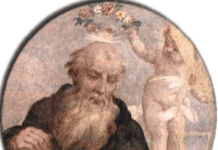Blessed André Grassett was the first Canadian to be beatified – not quite the first ‘saint’, which requires canonization, and that honour belongs to the heroic Jesuit martyrs (if we consider them Canadian, for they were all missionaries, born in France). The first canonized saint who was both born and died in Canada is Marguerite d’Youville, whom we celebrate on October 16th.
But today’s André – sharing the name of the future canonized doorkeeper of Montreal’s Oratory – died a martyr not here in Canada, but in France, in parallel fashion to the Jesuits, who were from France, but were all put to death in Canada. André’s connection to this land is by birth and initial upbringing – he came into the world in Montreal, April 3, 1758, but his father, originally from France, decided to return to his own native country in 1763, after the Treaty of Paris ended the Seven Years War (which included war between France and Britain) had been signed. This gave England control over much of Canada, and the Brits, as was their wont, imposed the Anglican religion, and significant loss of Catholic freedom – what is old is new again.
Hence, André spent most of his brief life in France, but the land of our birth does mark us (see the last verse of the hymn Immaculate Mary). So we may take him as a Canadian at heart, even if back then this fair and future Dominion was mostly referred to as ‘New France’, before ‘Upper and Lower Canada’ came into vogue. He entered the seminary, was ordained in 1783, and six years later the French Revolution erupted, with a violent reaction against the Church and the nobility, which quickly spiraled out of control into a demonic frenzy of bloodlust.
In 1792, the revolutionaries – who had taken control of the government, imposing arbitrary and ever-more chaotic ‘laws’ – promulgated the Civil Constitution of the Clergy, which would have made the priests, bishops and the very Church herself subservient to the State, and to the anti-Catholic cause of la revolution. The times were confusing, and the Pope delayed in his condemnation of the Constitution – but condemned it eventually was. Some saw this right away, others compromised and signed, even if such ‘juror priests’ were avoided by faithful Catholics, including the parents of the future Curé d’Ars.
Father André was one of those given eyes to see, and refused to sign, declaring quite firmly that his ‘conscience forbade him do so so’. So he was condemned in a hastily-convened trial in a courtyard, after which, along with many others, he was thrown to the guards, and summarily hacked to death with swords, pikes and bayonets, one of the many victims of what we now know as the ‘September Massacres’.
We are facing our own fanatical, anti-Catholic – really, anti-everything – mobs, and one wonders how long it might be before they move from the beheading and smashing of statues and the burning of churches to doing the same to flesh and blood human beings. There are a number of schools and buildings named after André Grasset across this fair land – they are the first things that come up if you search him on-line – but I wonder how many modern Canadians know who he was, or what he stood for, as we forget our own history. Je me souviens, indeed.
But we must, like Blessed André, hold to all that is true and good in our past and our present, stand fast in the truth, not violate our own conscience, regardless of the rage directed against us, and so hold our heads high in expectation and hope upon Christ’s return.
Blessed André Grasset, priez pour nous! +










